Water softener common questions
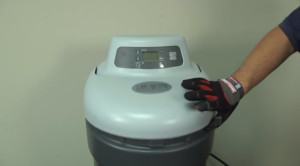

These common questions about water softeners are the ones our experts hear the most often from our customers. You might also find the help you need by checking the common symptoms and solutions for water softeners. When you’re ready to make a repair, search your model number to find replacement parts. Sears PartsDirect has the parts you need, no matter where you bought your water softener.
How often should I add salt?
You usually need to add 40 lbs. of salt to a water softener about every 8 weeks. Salt usage varies with your water usage.
How much salt should I add when the level is low?
Fill the water softener’s salt tank half full when adding salt pellets. Filling the tank more than half full can encourage a salt bridge to form inside the salt tank.
Will my water softener hurt my lawn?
Softened water won’t hurt your grass. A common myth is that the water softener adds salt to the water during the softening process. The water softener doesn’t add salt directly to the water. The resin beads exchange calcium and magnesium ions for sodium ions as water flows through the resin filter. The water coming from the water softener has a very small quantity of salt in it and won’t harm your grass.
Why does my skin feel slick when I shower in soft water?
Soft water dissolves soap better than hard water. When you bathe in soft water, the dissolved soap is harder to rinse off your skin, so it leaves a slick film of soap. The dissolved soap and soft water leaves your skin feeling slick.
Why do I need a water softener?
A water softener protects plumbing fixtures and helps detergents clean better. Hard water leaves scale deposits inside pipes and plumbing fixtures. Scale buildup damages fixtures and restricts water flow. Hard water also reacts with detergents to create soap scum, which inhibits cleaning. Detergents are less effective when used in hard water.
Where can I have my water hardness tested?
Visit the website of your municipal water supplier to determine your water hardness. Municipal water suppliers test water for hardness and post the results on their websites. If you have your own water well, use a water hardness test kit to determine your water hardness. Sears stores also test water samples for hardness.
How do I know my water softener is working correctly?
Fill a container with 12 ounces of water. Add one drop of liquid dish detergent to the water and shake the container. If suds appear in the water, then it’s soft. If not, then the water is still hard. Soft water also leaves your skin feeling slick when bathing.
Why does my water smell like rotten eggs?
Rotten egg smell in water is caused by hydrogen sulfide gas. Some ground water has dissolved hydrogen sulfide that emerges as gas when the water comes out of the tap. Additional treatment of ground water eliminates the hydrogen sulfide. Some water heaters use an anode rod to protect the tank against corrosion. Reaction of water with the anode rod creates hydrogen sulfide gas that’s released from the hot tap water. Install a less reactive anode rod in the water heater to eliminate the smell when the water heater causes it.
When should I schedule regeneration?
Schedule the water softener’s regeneration cycle for in the early morning, around 3 a.m. when everyone’s asleep and not using water. Water isn’t softened when the water softener is regenerating.
Why is my salt not going down?
A salt bridge in the water softener can prevent the salt level from dropping. A salt bridge forms when salt pellets clump together to form a “bridge” halfway down the salt tank. Use a broom handle to break up a salt bridge. A malfunctioning valve or defective timer can also prevent the water softener from using salt.
Symptoms for water softeners
Choose a symptom to see related water softener repairs.
Main causes: faulty brine valve assembly, bad rotor valve…
Main causes: clogged drain hose, faulty rotor valve, leaky rotor valve seals…
Main causes: salt bridge inside the salt tank, bad timer, valve motor failure, faulty rotor valve, clogged venturi…
Main causes: loose water line connections, cracked water-carrying components, bad rotor valve seals…
Main causes: lack of electrical power, bad power transformer, faulty timer…
Main causes: empty salt tank, salt bridge, depleted resin, clogged or damaged venturi, broken rotor position switch, fai…
Main causes: broken resin tank screen, bad resin tank seals, cracked upper distributor in resin tank…
Main causes: broken water flow meter, faulty timer, water flow to softener is bypassed…
Repair guides for water softeners
These step-by-step repair guides will help you safely fix what’s broken on your water softener.
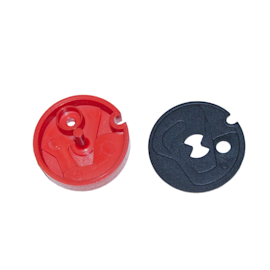
How to replace a water softener venturi
The venturi valve in your water softener draws brine water from the salt tank to the resin tank for regeneration. Follow…
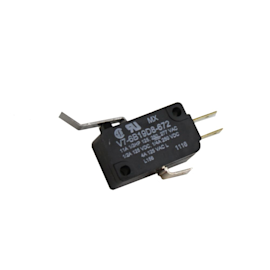
How to replace a water softener rotor position switch
The rotor position switch detects the position of the valve rotor. If the rotor position switch fails, follow these step…

How to replace a water softener timer
The timer is the control board you use to program the water softener. If the timer isn’t accepting commands when you pus…
Articles and videos for water softeners
Use the advice and tips in these articles and videos to get the most out of your water softener.
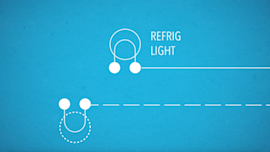
Learn some of the most common symbols found in a wiring diagram and what they mean.…
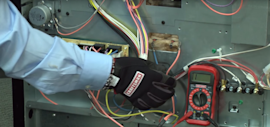
Learn how to use a multimeter to check for wiring problems in an appliance that's not working…
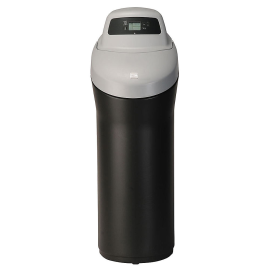
Keeping a water softener clean inside and out improves operation and appearance.…
